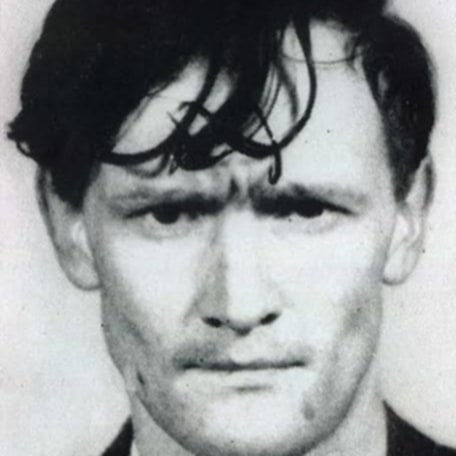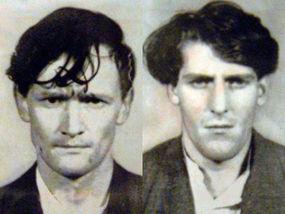
1940 - 1964
Gwynne Owen Evans
Summary
Name:
Years Active:
1964Birth:
April 01, 1940Status:
ExecutedClass:
MurdererVictims:
1Method:
StabbingDeath:
August 13, 1964Nationality:
United Kingdom
1940 - 1964
Gwynne Owen Evans
Summary: Murderer
Name:
Gwynne Owen EvansStatus:
ExecutedVictims:
1Method:
StabbingNationality:
United KingdomBirth:
April 01, 1940Death:
August 13, 1964Years Active:
1964Date Convicted:
July 7, 1964bio
Gwynne Owen Evans, born John Robson Walby on April 1, 1940, in Maryport, Cumberland, was the eldest surviving child in a working-class family. His early life was unstable and marked by academic and behavioral difficulties. He attended a secondary modern school and, for a brief period, was sent to Dovenby Hall Mental Colony for treatment. Leaving school at fifteen, he drifted between jobs — from hotel page boy to engine cleaner — and spent long spells unemployed. Early signs of delinquency appeared in his teens. In 1957, he was given a supervision order and sent to a hostel in Bristol, and shortly after, he enlisted in the Border Regiment. He was discharged within months for being “unfit under existing standards,” a pattern that repeated when he attempted to join both the Royal Inniskilling Fusiliers and the Royal Air Force.
Evans began a transient lifestyle marked by short-term jobs, frequent relocations, and growing criminal behavior. His petty crimes included theft, fraud, and driving offences, leading to several convictions and brief imprisonments. By 1963, he was lodging with Peter Allen and his wife in Preston. The two men, united by their shared failures and criminal tendencies, began committing minor thefts together, including removing lead from an abandoned building and breaking into cigarette machines. Their growing desperation for money — including fines from previous arrests — pushed them toward more serious crimes.
Peter Anthony Allen was born on April 4, 1943, in Wallasey, Cheshire. Like Evans, he left school at fifteen and struggled to maintain employment. His brief service in the Junior Leaders Regiment of the Royal Artillery ended after less than a year. In 1961, he married Mary, a cinema usherette, and tried to support his family through various jobs — from truck driving to scrap dealing — but was frequently dismissed for absenteeism or poor performance. His first brush with the law came in 1960 for aiding and abetting a car theft. By 1964, he too had a criminal record and was unemployed after being dismissed from a dairy job.
Evans and Allen’s friendship, cemented by shared frustration and failure, soon devolved into a partnership in crime. In early 1964, they committed multiple burglaries together, stealing vehicles and breaking into businesses. By March, they were desperate for money to pay legal fines. They decided to target John “Jack” West, a 53‑year‑old laundry driver known to Evans from a previous job, who they believed would lend them money — or could be robbed.
murder story
On April 6, 1964, John West, a 53-year-old van driver, returned to his home in Seaton, Cumberland, after a regular day at work. Later that night, a neighbor heard a noise coming from his house and saw a car leaving the area. The police were called and found West dead in his home. He had suffered severe head injuries and a stab wound to his chest.
The police discovered a raincoat in the house that contained a medallion belonging to Gwynne Owen Evans and an Army Memo Form associated with a woman named Norma O’Brien. The police traced O'Brien, who confirmed that she had met Evans before and recognized the medallion.

Evans and Peter Allen had stolen a car to reach West's house. After the murder, they abandoned the vehicle in a builder's yard, which led to a report from a neighbor about its suspicious presence. The car was traced back to the murder scene. Evans and Allen were quickly located through their previous criminal records.
On April 8, 1964, police arrested Allen at his home. He initially claimed he was not involved but later said Evans had proposed robbing West. Evans, on the other hand, stated that he only intended to borrow money from West and that Allen had forced his way into the house to commit the robbery.
During the investigation, both men shifted blame onto each other. They were charged with murder less than two days after the crime.
Their trial began on June 23, 1964. During the trial, each accused the other of being the primary attacker. Key testimony came from Mrs. Allen, who supported her husband's claim that both men were involved in the murder. After deliberating for three hours, the jury found both men guilty of capital murder.
Both men appealed the conviction, but their appeal was denied. The execution date was set for August 13, 1964. The Home Secretary decided against commuting their sentences, and both men were ultimately executed that morning. Gwynne Owen Evans was hanged at Manchester's Strangeways Prison, while Peter Allen was executed at Walton Prison in Liverpool.